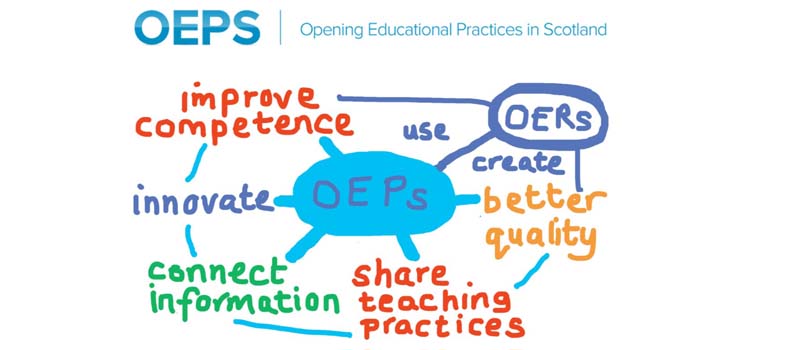Open Learning Champions - the OU in Scotland
The huge range of educational resources freely available online could be used to support people from non-traditional backgrounds into education but the array of available material is often overwhelming.
This barrier was the starting point for the Open Learning Champions project which has worked with Opening Educational Practices in Scotland (OEPS) to both widen access, through helping people navigate their way through open educational resources, and to gain insights into how people learn using open material.
The Open Learning Champions project is run by The Open University in Scotland and recognises that many non-traditional learners make the transition into formal education with the encouragement and support of a trusted intermediary. The initiative is aimed at those who play this ‘trusted advisor’ role to develop their skills so they can identify open learning resources which would be appropriate for their client group, be they young people, carers or homeless people. Through this route, the project is able to reach people who wouldn't normally consider themselves learners but, having gained confidence in their learning, might start to consider a return to formal education.
The project built upon a workshop which was developed by OEPS for Union Learning Representatives from Scottish Union Learning. The workshop guides participants through the open material created by The Open University on OpenLearn, FutureLearn and OpenLearn Works, before introducing the concept of Creative Commons and explaining how open material can be copied and adapted using OpenLearn Create. Participants open an account on OpenLearn at the workshop so they, as champions, encounter the same barriers as their learners and learn to address them.
The workshops have been described as transformative as many participants were previously unaware that so many resources could be used and adapted for their own client group.
The project, which has worked predominately with third sector organisations as well as colleges and libraries, offers individual workshops as well as area-based or themed workshops. Since the first workshop in June 2015, more than 120 Open Learning Champions have been trained in over fifty organisations, including the Scottish Childminding Association, the Prince's Trust and the Glasgow Association for Mental Health.
A survey of Open Learning Champions in autumn 2016 found that over a third of respondents have reached 20-plus learner and over 70 per cent of those learners had come from groups who are underrepresented in traditional higher education
Andrea Cochrane, from Angus Carers Centre said, "The workshop gave me the confidence to look at open learning with an open mind. Previous e-learning has been dry and isolating. This is fun, interactive and can be a really positive way of getting people back into education."
The workshops have been complemented by an online guide, Open Learning Champions which offers information and suggestions to facilitators on using Open Pathways to Higher Education, an OU project that helps individuals navigate their way through OpenLearn and on to more formal study if they are interested.
OEPS has also worked with the team to complement the Open Learning Champions project by pulling together 'learning packages'. The packages collate all The Open University's open material under seven broad themes (transitions, employability, languages / ESOL, health and social care, community learning, business and entrepreneurship, third sector/volunteering) so OU staff can see at a glance what material is available for partner organisations with limited budgets looking for CPD packages. OEPS also advised on how to contextualise the information so the team can create a bespoke document for partners setting out the available courses with an explanation on how the material might be used.
The Open Learning Champions project has developed many insights into how people from non-traditional backgrounds are using open material. For example, they have found that there is great demand for digital badges, which provide recognition of learning and can be listed on a learner's CV if they are considering a return to employment. The project has shared these insights with OEPS along with individual case studies so OEPS can disseminate that learning more widely .
